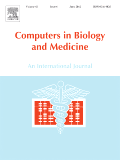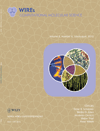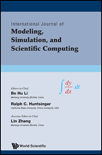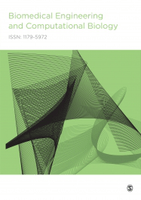
Nature Computational Science
Scope & Guideline
Advancing the Frontiers of Computational Discovery
Introduction
Aims and Scopes
- Computational Biology and Bioinformatics:
The journal emphasizes the use of computational models and algorithms to analyze biological data, including genomics, proteomics, and cellular dynamics, facilitating a deeper understanding of biological processes. - Machine Learning and Artificial Intelligence Applications:
A significant focus is on incorporating machine learning and AI techniques to enhance predictive modeling, data analysis, and decision-making processes across various scientific disciplines. - Materials Science and Engineering:
The journal explores computational approaches in materials discovery and design, including the development of new materials and understanding their properties via simulations and modeling. - Environmental and Sustainability Science:
Research related to computational methods for addressing environmental challenges, such as climate change and resource management, is a core area of interest. - Interdisciplinary Research:
The journal promotes studies that integrate different scientific fields, such as physics, chemistry, and social sciences, to tackle complex problems through computational frameworks. - Ethics and Equity in Computational Science:
There is an increasing focus on the ethical implications of computational research, particularly in areas like data privacy, AI bias, and inclusivity in scientific practices.
Trending and Emerging
- Data-Driven Approaches and Big Data Analytics:
There is a surge in research utilizing big data analytics to derive insights from large and complex datasets, enhancing the ability to make informed predictions and decisions in various scientific fields. - Digital Twins and Simulation Technologies:
The concept of digital twins—virtual replicas of physical systems—has gained traction, with increasing research on their applications in fields such as urban planning, healthcare, and engineering. - AI and Machine Learning Integration:
The integration of AI and machine learning into traditional computational methods is a key trend, with a focus on improving efficiency, accuracy, and the ability to solve previously intractable problems. - Health Informatics and Computational Medicine:
Research focused on the application of computational methods to healthcare, including predictive modeling for disease diagnosis and treatment optimization, is rapidly gaining prominence. - Ethical AI and Responsible Data Usage:
Emerging concerns regarding the ethical implications of AI and data usage are prompting research into developing frameworks for responsible and equitable practices in computational science. - Sustainability and Climate Modeling:
Research addressing sustainability challenges and climate impact through computational modeling is increasingly relevant, reflecting a broader societal focus on environmental issues.
Declining or Waning
- Traditional Statistical Methods:
There has been a noticeable decline in the reliance on traditional statistical methods in favor of more advanced computational techniques, such as machine learning and AI, which offer greater flexibility and predictive power. - Purely Theoretical Studies:
The journal has seen fewer purely theoretical papers that do not incorporate practical applications or computational tools, as there is a growing demand for research that translates theory into practice. - Single-Domain Focus:
Research that focuses solely on a single scientific domain without interdisciplinary collaboration is becoming less frequent, as the complexity of modern scientific problems often necessitates multi-domain approaches.
Similar Journals

Computation
Fostering innovation in computational research.Computation, published by MDPI, is an esteemed open-access journal that has been contributing to the fields of applied mathematics and computer science since its inception in 2013. With an E-ISSN of 2079-3197, this Swiss-based journal operates under a philosophy of free knowledge dissemination, allowing researchers, professionals, and students globally to access high-quality content without financial barriers. Recognized for its rigorous peer-review process, Computation is currently categorized in the Q2 and Q3 quartiles across significant domains, including Applied Mathematics (#181/635), Theoretical Computer Science (#52/130), and Modeling and Simulation (#138/324). As it converges towards 2024, the journal continues to attract innovative and impactful research aimed at advancing theoretical frameworks and practical applications within these disciplines. Joining the Computation community not only enriches individual research portfolios but also contributes to the broader conversation on computational methodologies and their applications in solving real-world problems.

COMPUTERS IN BIOLOGY AND MEDICINE
Advancing the Fusion of Technology and HealthcareCOMPUTERS IN BIOLOGY AND MEDICINE is a prestigious academic journal published by Pergamon-Elsevier Science Ltd, dedicated to advancing the fields of Computer Science Applications and Health Informatics. With an impressive impact factor and ranking within the Q1 quartile for both categories, this journal plays a crucial role in disseminating high-quality research findings that influence cutting-edge developments at the intersection of computing and healthcare. Covering a broad range of topics from computational biology to medical informatics, it serves as a vital resource for researchers, professionals, and students striving to harness technology for medical advancements. The journal has been publishing since 1970 and continues to evolve, incorporating the latest trends and innovations in the field, thereby ensuring that it remains a key contributor to scientific inquiry and knowledge. With accessible content and a global reach, COMPUTERS IN BIOLOGY AND MEDICINE invites submissions that elevate the understanding and application of computational methods in biological and medical contexts.

Quantitative Biology
Harnessing Mathematical Models to Illuminate Biological PhenomenaQuantitative Biology is a prestigious journal published by WILEY, focusing on the interdisciplinary study of quantitative approaches in the biological sciences. With an ISSN of 2095-4689 and an E-ISSN of 2095-4697, this journal has established itself as a critical platform for researchers exploring complex biological systems through mathematical and computational methodologies. Operating out of China, Quantitative Biology significantly contributes to its field, holding a Q2 ranking in various categories, including Applied Mathematics and Biochemistry, Genetics and Molecular Biology, according to the latest Scopus rankings. These rankings reflect the journal's commitment to publishing high-quality research that employs advanced modeling and simulation techniques. The journal's impact is evident with its position in the 84th percentile for Applied Mathematics, indicating its relevance and growth in a competitive academic landscape. Although it does not currently operate under an Open Access model, the journal is pivotal for professionals and students alike, aiming to bridge the gap between mathematical theories and biological applications. Researchers are encouraged to submit their innovative findings and engage with the vibrant community dedicated to advancing the quantitative understanding of biological phenomena.

PLoS Computational Biology
Unlocking Insights Through Computational InnovationPLoS Computational Biology is a premier open-access journal published by the Public Library of Science, committed to advancing the understanding of complex biological data through computational approaches. Since its inception in 2005, the journal has made significant strides in the fields of Cellular and Molecular Neuroscience, Computational Theory and Mathematics, Ecology, Genetics, and Molecular Biology, achieving a notable Q1 ranking in various categories as of 2023. With an exceptional impact factor and an esteemed ranking—such as Rank #23/176 in Computational Theory and Mathematics—PLoS Computational Biology provides a vital platform for researchers, professionals, and students to disseminate their cutting-edge findings and insights. The journal's open-access model ensures that high-quality research is freely accessible worldwide, fostering collaboration and innovation across disciplines. Located in San Francisco, CA, it serves as a hub for the global scientific community, making it an indispensable resource for anyone at the forefront of computational biology and its diverse applications.

Wiley Interdisciplinary Reviews-Computational Molecular Science
Connecting Computational Methods with Molecular BreakthroughsWiley Interdisciplinary Reviews: Computational Molecular Science is a premier journal published by WILEY, dedicated to the intersection of computational techniques and molecular science. Boasting an impressive impact factor and consistently ranking in the Q1 category across several key disciplines including Biochemistry, Computational Mathematics, Computer Science Applications, Materials Chemistry, and Physical and Theoretical Chemistry, this journal plays a crucial role in disseminating high-quality research that bridges multiple fields. With its focus on providing a platform for interdisciplinary dialogue and innovative computational solutions, it serves as an essential resource for researchers, professionals, and students eager to push the boundaries of molecular science. While the journal does not currently offer open access, it remains a vital conduit for scholarly communication, fostering advancements in understanding molecular interactions through computational methods. The journal is based in the United States, contributing to its global outreach and impact in the scientific community.

Computational and Mathematical Methods
Empowering Discoveries in Computational and Mathematical SciencesComputational and Mathematical Methods is a dynamic peer-reviewed journal published by Wiley-Hindawi, focusing on innovative research in the fields of computational mathematics, mechanics, and theory. Since its transition to an Open Access format in 2022, the journal has enhanced its accessibility to researchers and practitioners globally, providing a platform for the dissemination of high-quality studies that contribute to emerging developments in mathematical modeling and computational techniques. Based in the United Kingdom, this journal is committed to fostering collaboration amongst scholars, evidenced by its rankings within Scopus: Q3 in computational mathematics, computational mechanics, and computational theory and mathematics, reflecting its relevance and influence within these critical fields. With an emphasis on interdisciplinary studies, Computational and Mathematical Methods is an essential resource for researchers, professionals, and students seeking to expand their knowledge and apply cutting-edge methodologies to practical challenges.

Journal of Computational Methods in Sciences and Engineering
Championing Innovation in Engineering and Computational MethodsWelcome to the Journal of Computational Methods in Sciences and Engineering, published by IOS PRESS in the vibrant academic landscape of the Netherlands. With a dedicated focus on advancing the application of computational techniques across various domains, this journal serves as a vital platform for researchers, professionals, and students alike. Although it resides in the Q4 category across key disciplines such as Computational Mathematics, Computer Science Applications, and Engineering, the journal aims to foster innovation and disseminate emerging trends in computational methodologies. Despite its current ranking, the journal’s mission is to facilitate a dialogue on pioneering approaches and their practical implications, supporting the growth and evolution of computational sciences. With a publication history that spans from 2001 to 2024, we invite contributions that reflect scientific rigor and creative solutions to complex engineering challenges, reinforcing our commitment to bridging theory and practice in this dynamic field.

International Journal of Modeling Simulation and Scientific Computing
Connecting Theory and Practice in Modeling and SimulationThe International Journal of Modeling Simulation and Scientific Computing, published by WORLD SCIENTIFIC PUBL CO PTE LTD, is a pivotal resource in the realms of Computer Science Applications and Modeling and Simulation. With an ISSN of 1793-9623 and an E-ISSN of 1793-9615, this journal serves as a platform for innovative and high-quality research from 2010 to 2024, contributing to the advancement of methodologies and applications in various scientific fields. Although currently categorized in the Q4 quartile for both recognized domains and positioned in the 42nd and 36th percentiles in the Scopus rankings for Mathematics and Computer Science respectively, the journal encourages scholarly exchange and fosters the integration of modeling and computational analysis in scientific research. Researchers, professionals, and students alike will find this journal an essential tool to stay updated with trends, methodologies, and cutting-edge findings in simulation and computational techniques that drive scientific inquiry today.

Biomedical Engineering and Computational Biology
Transforming Complex Data into Healthcare SolutionsBiomedical Engineering and Computational Biology is a premier journal dedicated to advancing the fields of biomedical engineering and computational biology through rigorous research and innovation. Published by SAGE Publications Ltd, this Open Access journal has been providing a platform for the dissemination of high-quality research since 2009, enabling wider accessibility and collaboration among scientists and practitioners around the globe. With its comprehensive scope that encompasses the intersection of engineering principles and biological systems, the journal plays a critical role in fostering advancements in healthcare technologies and computational methods. Researchers, professionals, and students alike can take advantage of its rich repository of articles that contribute significantly to the understanding and application of complex biological data through computational techniques. The journal’s commitment to excellence is reflected in its high visibility within the scientific community, making it an essential resource for those looking to stay at the forefront of this dynamic field.

COMPUTATIONAL GEOSCIENCES
Exploring the Intersection of Geosciences and ComputationCOMPUTATIONAL GEOSCIENCES, published by SPRINGER, is a distinguished journal in the fields of Computational Mathematics, Computational Theory and Mathematics, and Computer Science Applications. With a focus on the intersection of computational methodologies and geosciences, this journal serves as a vital platform for researchers, professionals, and students seeking to advance the understanding and application of computational techniques in earth sciences. The journal has consistently maintained a strong standing, evident from its impressive Q2 quartile ranking in 2023 across various categories, and significant Scopus rankings in Computational Mathematics and Earth and Planetary Sciences. The global impact of this journal is underscored not only by its rigorous peer-review process but also by its commitment to disseminating high-quality research that bridges theoretical advances and practical applications within the earth sciences domain. Scientifically rich and culturally diverse, COMPUTATIONAL GEOSCIENCES aims to foster collaboration and innovation while addressing pressing challenges posed by our changing planet, making it an essential resource for the academic community.